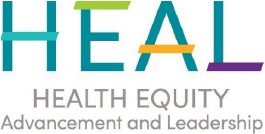News
Press Release
AAFA Launches New Health Equity Initiative for Communities Facing Highest Burden of Asthma
 The HEAL Innovation program aims to reduce disparities in asthma by investing in community- based programs. Amgen Contributes $1 Million to First Year of HEAL Innovation.
The HEAL Innovation program aims to reduce disparities in asthma by investing in community- based programs. Amgen Contributes $1 Million to First Year of HEAL Innovation.
Washington D.C., May 3, 2022 — Today, on World Asthma Day, the Asthma and Allergy Foundation of America (AAFA) announces the launch of its new Health Equity Advancement and Leadership (HEAL) program. This initiative bolsters AAFA’s commitment to drastically reduce health disparities in communities that bear the heaviest burden of asthma.
As part of the HEAL program, AAFA is announcing HEAL Innovation, a multiyear project with the goal of building and supporting community-based interventions to address inequities in asthma. In the U.S., the burden of asthma falls disproportionately on low-income or racial and ethnic minority populations. Decades of research and public health data have extensively identified disparities in asthma prevalence, mortality, and healthcare utilization along racial, ethnic, and socioeconomic lines.
“AAFA is eager to invest in communities and local partners to improve asthma care and outcomes,” states Kenneth Mendez, AAFA’s CEO and president. “While the costs of asthma and health disparities total billions of dollars every year for Americans, we know that we can significantly improve asthma outcomes and reduce costs through investments in the community. In addition to saving money, it’s simply the right thing to do on behalf of those who have experienced stark inequities in health.”
Each year, HEAL Innovation will identify and support four local, community-based asthma programs tailored to at-risk populations most impacted by asthma. The first year of HEAL Innovation is supported exclusively by Amgen through a $1 million sponsorship.
“Amgen is deeply committed to addressing health disparities, so everyone – no matter their disease or where they live – can have access to healthcare resources. Asthma is an especially complex disease, and we know multidimensional disparities have created significant challenges in achieving equitable health outcomes,” said Ponda Motsepe-Ditshego, vice president, Global Medical Therapeutic Area Head, General Medicine at Amgen. “This is why we’re supporting AAFA’s critical work with HEAL Innovation. By creating personalized interventions tailored to specific communities, this program is a crucial step forward in making a measurable impact for people with asthma most in need.”
The overall goal of HEAL Innovation is to reduce mortality and morbidity among high-risk populations by partnering with and strengthening local community programs. Because all asthma is local, AAFA recognizes the importance of combining national leadership with community- driven action. The first HEAL Innovation site to be confirmed is the greater Detroit area, in partnership with the AAFA Michigan Chapter (AAFA-MI). AAFA-MI will implement a multi- component intervention that will improve asthma control through general health and wellness, access to specialty care, assessment of home environments, and asthma self-management education.
“We are excited for the opportunity to provide a more holistic approach to aid our community in getting comprehensive asthma care and supportive tools to improve overall health,” says Kathleen Slonager, executive director of AAFA-MI. “With AAFA-MI’s deep roots in the community in addition to investment from HEAL Innovation, we are confident that this intervention will help to improve health outcomes for people with asthma in the Detroit area.”
In addition to Detroit, the first year of HEAL Innovation will fund programs in Chicago, Los Angeles, and St. Louis.
HEAL is the latest initiative of AAFA’s strategic focus to improve health equity for underserved populations. In 2020, the organization published a 15-year update to its Asthma Disparities in America report which outlined nearly 70 strategies to improve asthma health in underserved populations. AAFA also provided $200,000 to the AAFA Severe Asthma Program at Rady Children’s Hospital in San Diego to help low-income children in California gain control of their asthma and cut down on emergency visits and hospitalizations. The following year, AAFA formed two new collaborations in New York state. With the New York State Energy Research and Development Authority (NYSERDA), AAFA is supporting the state’s $30 million Building Better Homes and $40 million Buildings of Excellence Competition initiatives which will advance climate friendly, carbon neutral homes that have health benefits like better indoor air quality, across the State, including to disadvantaged communities. AAFA is also funding a community health pilot program by AIRnyc to connect households managing asthma with health education, health care, and social programs.
“We know how to address disparities and improve asthma outcomes at the local level,” states Sanaz Eftekhari, vice president of Corporate Affairs and Research for AAFA. “Community-based asthma interventions have been proven effective and HEAL will generate momentum to sustain critical programs across the nation.”
To learn more about AAFA’s HEAL program and health equity work, visit: aafa.org/healthequity
Kimberly Rafferty
Asthma and Allergy Foundation of America (AAFA)
gro.afaa@aidem
About AAFA
Founded in 1953, AAFA is the oldest and largest non-profit patient organization dedicated to saving lives and reducing the burden of disease for people with asthma, allergies and related conditions through research, education, advocacy and support. AAFA offers extensive support for individuals and families affected by asthma and allergic diseases, such as food allergies and atopic dermatitis (eczema). Through its online patient support communities, network of local chapters and affiliated support groups, AAFA empowers patients and their families by providing practical, evidence-based information and community programs and services. AAFA is the only asthma and allergy patient advocacy group that is certified to meet the standards of excellence set by the National Health Council. For more information, visit: www.aafa.org








